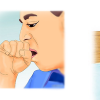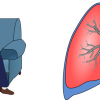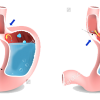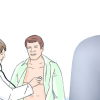Tag: cough
-
Lung Cancer
Lung cancer (Bronchogenic carcinoma) is the most common type of cancer worldwide and a leading cause of cancer death for both men and women. Lung cancer occurs when the normal cells of lungs abnormally change their
-
Cough
Cough is our body’s protective response to the presence of irritants in the airway. It is a reflex action caused by the stimulation of the nerve endings in the respiratory tract by stimuli such as allergen,
-
Pneumonia
Pneumonia is an infection of the lungs caused by a variety of germs. These germs reach the air sacs (lowest part of airways) after inhalation, overcoming body's normal defense mechanism like nasal hairs, mucus and
-
HIV/AIDS
Introduction HIV (Human Immunodeficiency Virus) is the virus that causes AIDS (Acquired Immunodeficiency Syndrome). Infection by HIV weakens your immune system. When the immune system becomes too weak to fight, organisms that
-
Heart Failure
Heart failure means your heart is not able to pump out sufficient amount of blood into the rest of the body. It does not mean that your heart has stopped to beat which is called “cardiac arrest” (see
-
Chronic Obstructive Pulmonary Disease (COPD)
COPD is a chronic condition of the lungs that causes difficulty in breathing. It is caused by long standing exposure to irritant gas or particles most commonly by cigarette smoking. In developing countries indoor
-
Asthma
Asthma is a chronic respiratory disease that affects your airways (windpipe). The windpipe is inflamed, narrowed and swollen that causes difficulty in breathing now and then. A person with asthma has no
-
Gasteroesophageal Reflux Disease
Gasteroesophageal reflux disease (GERD) is also known as acid reflux. GERD occurs is when stomach contents leak backwards (called “reflux”) into esophagus and cause symptoms or complications. Reflux is a
-
Acid Reflux Disease
When we eat food, it travels through the mouth to the food pipe (esophagus) and then to the stomach. Once in the stomach, food cannot come back up into the esophagus under normal conditions because of the presence of the lower esophageal sphincter










